If you’re joining us just now, follow the snake’s tail to the Prologue or climb a ladder to the Table of Contents.
Chapter 11: Into the Great Sewer
“This ride sucks,” Evan said. The blood trickling down his nose was evaporating, even as he wiped it away. The rattling chain under the rails of the battered amusement-park car dragged him and Niyati into the thickening darkness of the haunted castle.
“I have a feeling it’s about to get worse,” Niyati remarked.
From out of the castle flew hundreds of screeching bats. Their wings were rubber because they were Halloween decorations. The colony passed overhead and rose in an inky mass toward the moon.
The car entered a hall lined with suits of armor. The helmets were crested with crescent moons.—“An alliterative flourish,” Niyati remarked; and Evan somehow knew what she meant. He wondered if the suits of armor were going to spring to life and attack them, but that didn’t happen, though the visors jiggled and the voices behind them guffawed.
The car rounded a corner and passed a long murky corridor with holographic ghosts standing inside of it. Niyati explained that the ghosts (which seemed unnervingly curious) were real.
“You can only see these ghosts in your dreams. They’re the ancestral memories we carry with us. They’re encoded in our DNA. The exact same ones are in me as well.”
“I saw them once when I was awake.”
“Don’t say that, Evan. Only the mad and spiritually enlightened can see them while awake. And I know that you’re not spiritually enlightened.”
Evan looked at her and then turned away.
“I was in Tijuana on spring break with some friends.”
Niyati squeezed his hand. “You were high on mushrooms and this put you in a temporary state of madness.”
“I’ve never done mushrooms!”
“You didn’t take them intentionally,” Niyati said. “You were drugged. Remember how you lost your wallet that night too?”
“Oh, yeah. It must’ve been that hot waitress at the tequila bar.—Or, maybe it was that guy who offered me and my buddies a discount for a group massage.” Evan fidgeted in his seat. “That guy was kinda weird.”
Niyati sighed.
A scrollwork banner with gothic type hung over the entrance to the dungeon. It read: “Games Folks Play in the U. S. of A.”
TV sets were crammed in the damp niches of the walls and water trickled onto them. Some of the TVs had rabbit ears; all had bad reception. The images kept scrolling up and up and up. The canned laughter laughed, as wiped-out millionaires jumped from high-rises to the accompaniment of game-show buzzers and diabolically grinning hosts saying “Sorry, you lose.”
One of the game shows was called Let’s Make ’Em Squeal! The object was to bully and badger the contestants, who smiled and laughed and tried to make light of what was happening to them until they could bear it no more. Then they dissolved into tears as the studio audience jeered and hooted at them.
There was a program called Who’ll Share My Loveseat? in which women posed questions to men who sat behind a taupe screen. At the end of the show, the man whom the woman had chosen to be her mate stepped from behind the screen and revealed himself to be the host who had lied all along and rigged the rules to his advantage.
The Bobby-Soxer Showdown offered cash prizes of up to $100. But Lynn, whose grandparents had emigrated to America from Guangzhou, was disqualified before even having a chance to audition. The judges and producers never said why, but Lynn knew very well.
There were primetime sitcoms from all decades of the mid-20th century in which the setting changed but the plot stayed the same: terrified women wore brittle smiles and played complicated RPGs with churchgoing men who opened the door in the late afternoons, hung their hats on the peg and said “Honey, I’m home!”—and then beat and berated them to the thunderous applause of the televangelical congregation whose fundraiser had “almost met this month’s goal.”
“Can I tell you something?” the bloodless vixen asked. “This cigarette doesn’t even taste filtered.”—“‘Cause when you’ve had a long day,” the cowboy said, “you need J. Pendle Ray” (proffering a bottle).
On another screen, power brokers played poker in wood-paneled rooms and the lives of people were the stacked-up chips. Through a haze of smoke and a cloud of throaty laughter, pot-bellied goons watched news segments in which governors ordered water cannons trained on demonstrators, cops brawled with black women in horn-rimmed glasses, and olive-green helicopters fanned the paddies of Vietnam.
Pocked-faced politicians wore the rubber masks of saints. They shouted racial slurs and pumped their fists at Klan rallies.—Then they told the reporters that what they had just done (and what everyone had seen them do) had been taken out of context. This satisfied their supporters, who mouthed the slogans of their false messiahs and told the interviewers (in heated voices) that they were very pleased, indeed, with what the God-fearing man from Oopapalooza had said, because his new lie had corrected the inaccuracies of the old and exposed to ridicule the utter stupidity of his detractors.
The portcullis at the end of the dungeon rose and Evan and Niyati passed beneath it.
They entered Evan’s high school gym.
“I don’t understand,” he said. The car came to a stop.
A tournament was in progress. Evan’s doppelgänger wore a singlet and stood on the mat talking to his coach. His opponent was stripped to the waist, wore red and white face paint, and had papier-mâché horns on his head.
“I get it,” Evan said, “I have to wrestle my demons.”
The opponents squared off and the buzzer sounded. They came together and Evan outmaneuvered the other wrestler and caught him in a hammerlock. But his opponent sprouted two more arms and threw Evan prone to the ground.
As Evan’s doppelgänger landed on the mat, which transformed into pavement as he struck it, Evan felt the impact and had the wind blown out of him from his seat in the car. The demon drove its knee into the doppelgänger’s spine and howled triumphantly, its real fangs dripping venom.
“I can’t breathe!—I can’t breathe!” the doppelgänger exclaimed. Then Evan himself couldn’t breathe and Niyati leaned over to him and cried out for help. But the canned laughter laughed, since the suffering of others was a pleasing diversion from the comfort of one’s climate-controlled home.
The camcorder that the pimpled geek who worked in the school’s multimedia center used for concerts and tournaments transformed into a handheld smartphone (even though these had not yet been invented). And now the geek was documenting the atrocity that was unfolding.
Niyati’s doppelgänger appeared next to her and pulled her off of Evan.
“Evan!” Niyati cried.
“Watch what happens,” the doppelgänger whispered into her ear.
Time seemed to slow down for Evan. He could neither inhale nor exhale. He heard his heart pounding in his throat. His face turned blue and his vision blurred as the petechiae burst and suffused his eyes with blood. His life ebbed from him until he was no more.—Then after 8 minutes and 46 seconds, the car lurched forward and Evan could breathe again.
They passed through the vertical rubber flaps and the chain under them became a conveyor belt. The figures behind the tall windows to the right were airport security officials, but they wore lab coats and night-vision goggles. They were X-raying Evan and Niyati, looking into their minds and scrutinizing their past. Banks of black-and-white monitors and reel-to-reel tape recorders stood behind them.
On the flickering monitors Evan saw his first wet dream, his hidden moments of “self-abuse,” his college hookups—all of which had somehow been recorded and were now playing on a loop. On a separate screen, pubescent Niyati wept on the bathroom floor because she’d had her first period and was afraid something was wrong with her. Her gynecological checkups were studied; and then the tapes were re-wound so they could be watched again. The men in the lab coats—and they were all men—shook their heads in disgust. They blamed Evan and Niyati for willfully participating in these sexual things, which they called “outrages” and “perversions of nature.” They wrote down their observations on clipboards as their nostrils flared and the drool trickled down their pale lips.
Rusty goose-necked tentacles rose up on either side of the car. The tentacles were mounted with cameras and microphones. A robotic arm shot steam into their faces. It was marijuana. Evan’s eyes became bloodshot: he had been caught with contraband and was going to jail. Niyati’s career was also ruined, because she had been with him in the car and had stashed the drugs in her blouse at his bidding.
Neither of them could look at the other.
At first Evan couldn’t hear what was being said behind the glass. But now the intercom crackled on and the voices became clear. The leader, a fat man who was the only one not wearing goggles, said to the others: “These two are the problem!—Not us!” Then he proved this by unfolding a barber’s straight razor and cutting out his eyes with it. Blood splattered on the windows and Evan and Niyati were now in straightjackets because they were the problem—not the men in the lab coats. (Evan’s sleeping form pulled off the blanket that the airline stewardess had draped over him.)
The car passed through the vertical rubber flaps at the other end of the X-ray machine; and they were no longer in straight jackets.
There was a splash because the haunted house car had become a boat and slid down the slipway into the waters of the Cloaca Maxima (The Great Sewer). It smelled of shit and decay and everything in the world that is rank, noisome, and pestilential, but which we tolerate because we’ve grown used to it. The sky could not be seen through the sepia mist that environed them. But it would not have mattered even if they could have seen through it, since the ceiling of the world was ribbed and coped by the sewer’s gothic arches.
The chain under the boat dragged them between two tall-masted ships. Skeletal pirates leaned over the deck rails. A recording of hornpipes intermingled with voices saying suitably piratical things was heard: “Shiver me timbers!” and “I wants me treasure!” The voices came from speakers behind the hulls.
The boat’s rubber bumper collided with the prow of the S. S. Kali, whose rigging and rope ladders were adorned with fifty severed heads. The chain underneath them tugged the boat away; but the rear bumper struck the S. S. Kali a second time, which caused one of the heads to fall from the rigging and land on the deck with an oily splat.
In the water Evan saw the body of a naked giant—as big as Gulliver among the Lilliputians—lying supine on the flood. The giant’s flesh twitched in his death spasms as the eyelids fluttered, and Evan saw that the face of the giant was his own. Fifteen animatronic pirates were on the corpse’s chest, singing “Fifteen men on a dead man’s chest” (which the canned laughter found especially amusing).
A foghorn sounded and a leaning lighthouse could be seen, at the base of which fiddler crabs scuttled over seaweed and fed on human guts. The light swept over the water. The island was surrounded by a squamous tangle of black sea snakes, which reminded Evan that he and Niyati were playing Snakes and Ladders in his backyard—and it was 1979. His backyard deck was now the rotting deck of a sinking ship. He and Niyati stood on it and looked down at two seven-year-olds playing Snakes and Ladders near the ship’s windlass.
The children were shriveled and gaunt because they were merfolk and starving. Their fishtails reeked, because Evan had eaten fish for dinner. He bent down and opened the barber’s straight razor and cut off hanks from the boy’s tail and fed it to him. Then he cut a strip of flesh from the girl’s tail and fed this to her. The children smiled at each other and then at Evan, because they had bonded with him—and Evan had always dreamed of having children, and now his dream (within this dream) had been fulfilled. The game board was spattered with cherry-red fish blood, which caused the four playing pieces to glow because they were drawing nourishment from the blood, which was rising up the umbilical cords connecting the pieces to the fetuses floating overhead.
Madame Blavatsky was a fishwife whose booth stood near the ship’s wheel. With her cleaver she chopped off two fish heads, which decapitated the children whose tails flapped against the deck in their death throes.
“Nooooo!” Evan cried out.
Then his eyes opened on the plane, though he was still asleep. Madame Blavatsky’s lips were pressed against his. She was trying to suck the dream out of him. A powerful hand seized her by the hair and flung her astral form out of the plane.—“I can’t do everything by myself!” the Havasupai man scolded the unborn universe, which had been hiding in Evan’s pink Bermudas and changing colors in agitation during Madame Blavatsky’s attack.
Madame Blavatsky’s astral form flew head over heels through the moonlit clouds. She rose higher and higher in the thin air, and shrieked like a banshee as the airplane continued on its easterly course 33,000 feet over the Pacific Ocean.
Then she slammed into a web, but it wasn’t just any web. It was the dreamcatcher-catcher, which could only catch other dreamcatchers on the Astral Plane. She knew that in order to rejoin the game, she would have to let herself die into the Havasupai man’s trap. So Madame Blavatsky willed her astral form fused to the strands of the web, which tunneled their way into her arteries and drained her astral blood from her dead and withered heart.
Hundreds of spiders crawled over the web, which had become a web of glass. They crept into Madame Blavatsky’s mouth. Then she grinned in ecstasy and triumph as her body transformed into a lump of inert coal that shattered into twelve diamonds arranged in a swirl at the center of the web, because twelve was the highest number one could roll on the twelve-sided die.
The dreamcatcher-catcher rose up through the stratosphere until it reached outer space. It drifted away from the planet Earth where the sun rises in the west. And as it passed the moon, the Havasupai man seized it by its pendent cord and hung it by the front door of that archetypal gas station off Route 66 (some forty miles southwest of the Grand Canyon)—far, far away on the Astral Plane.





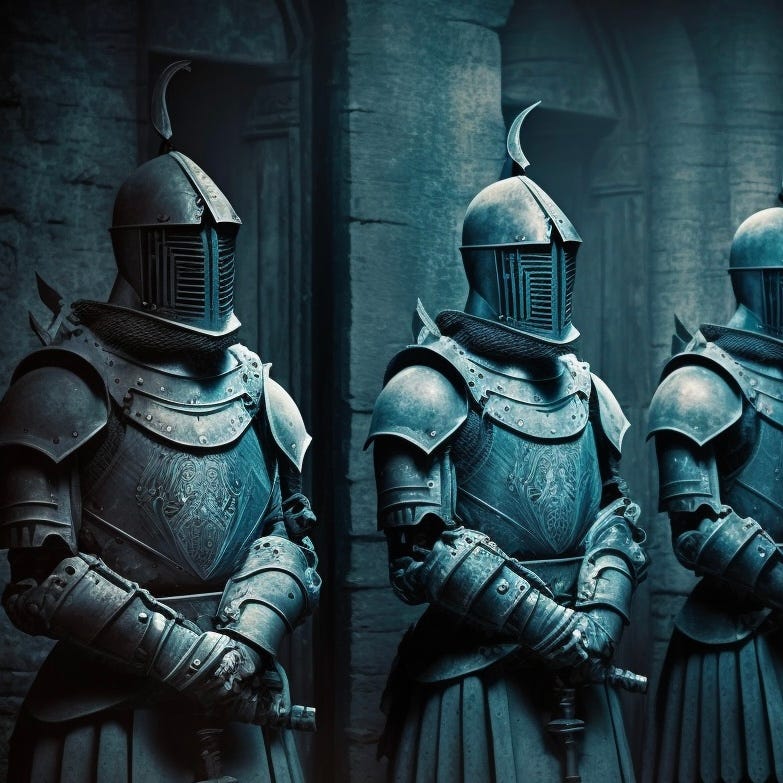
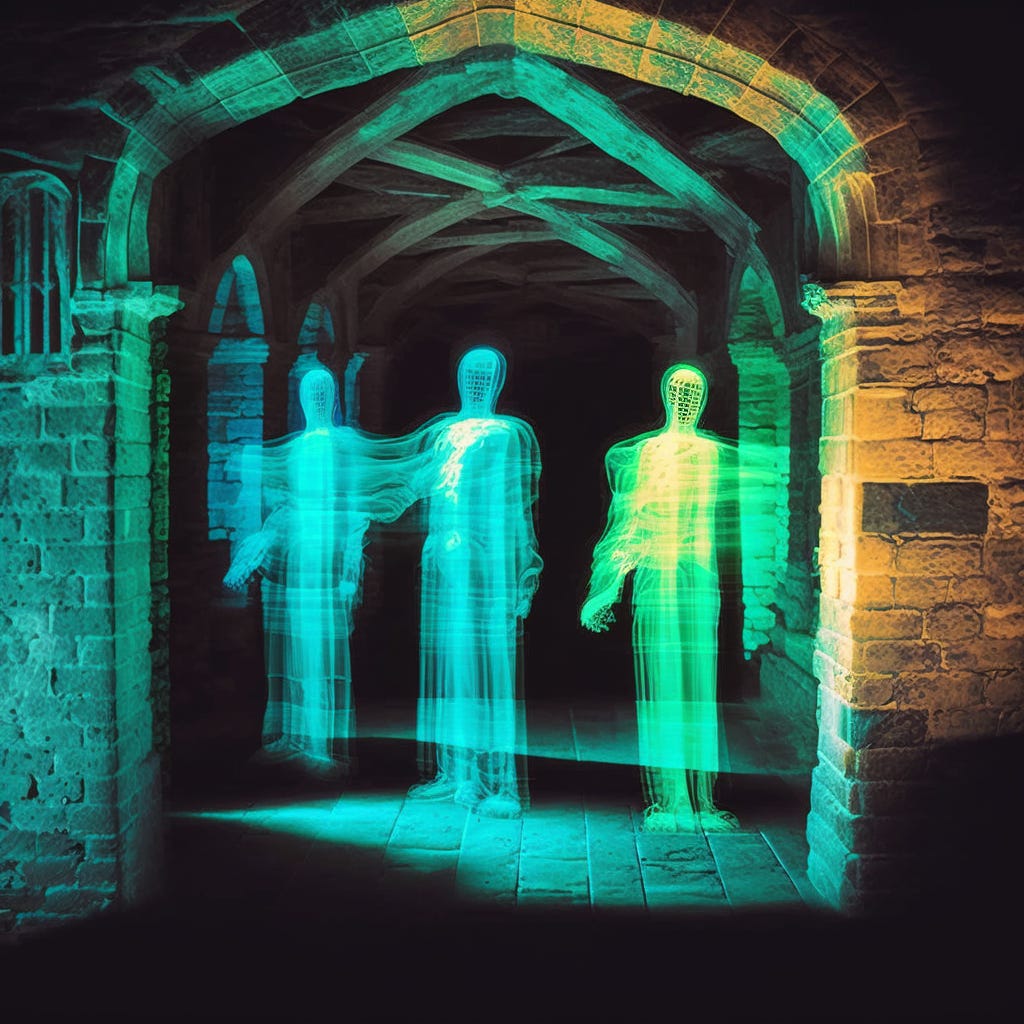
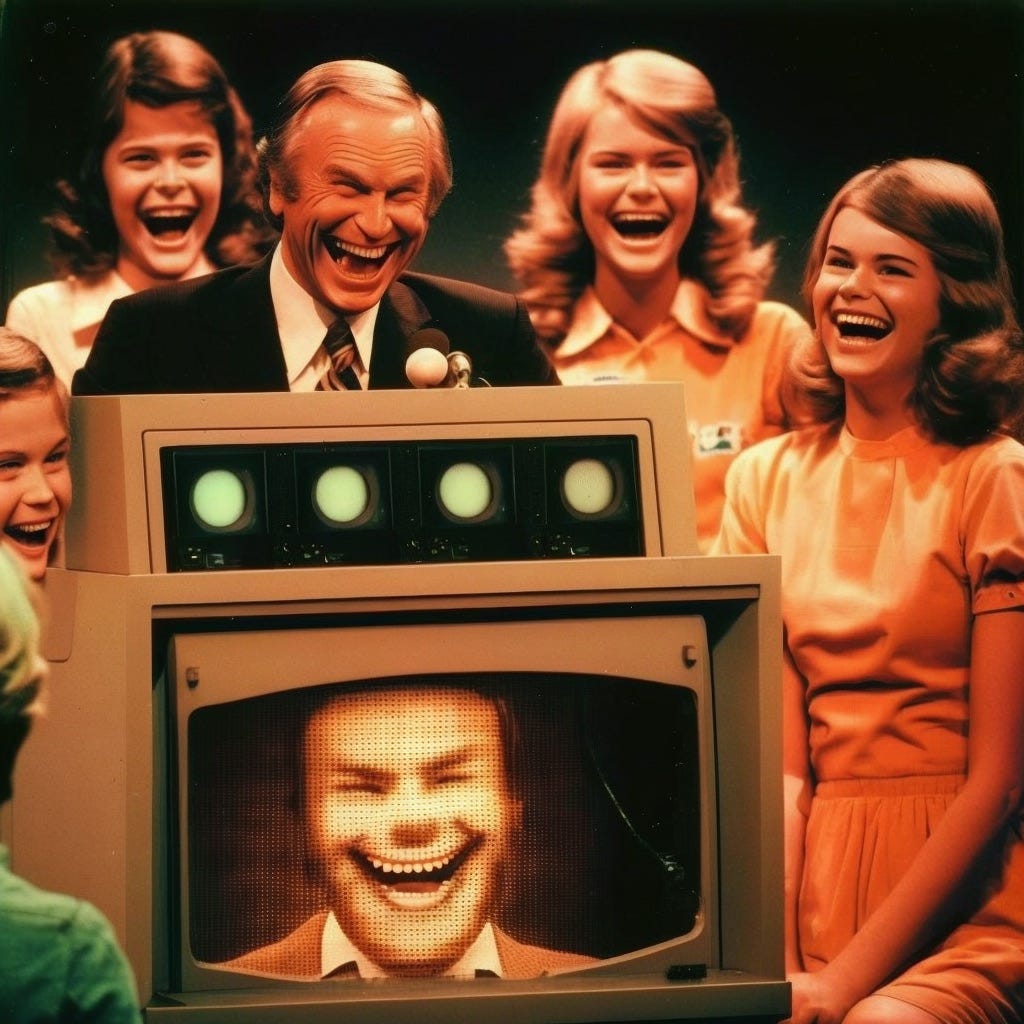

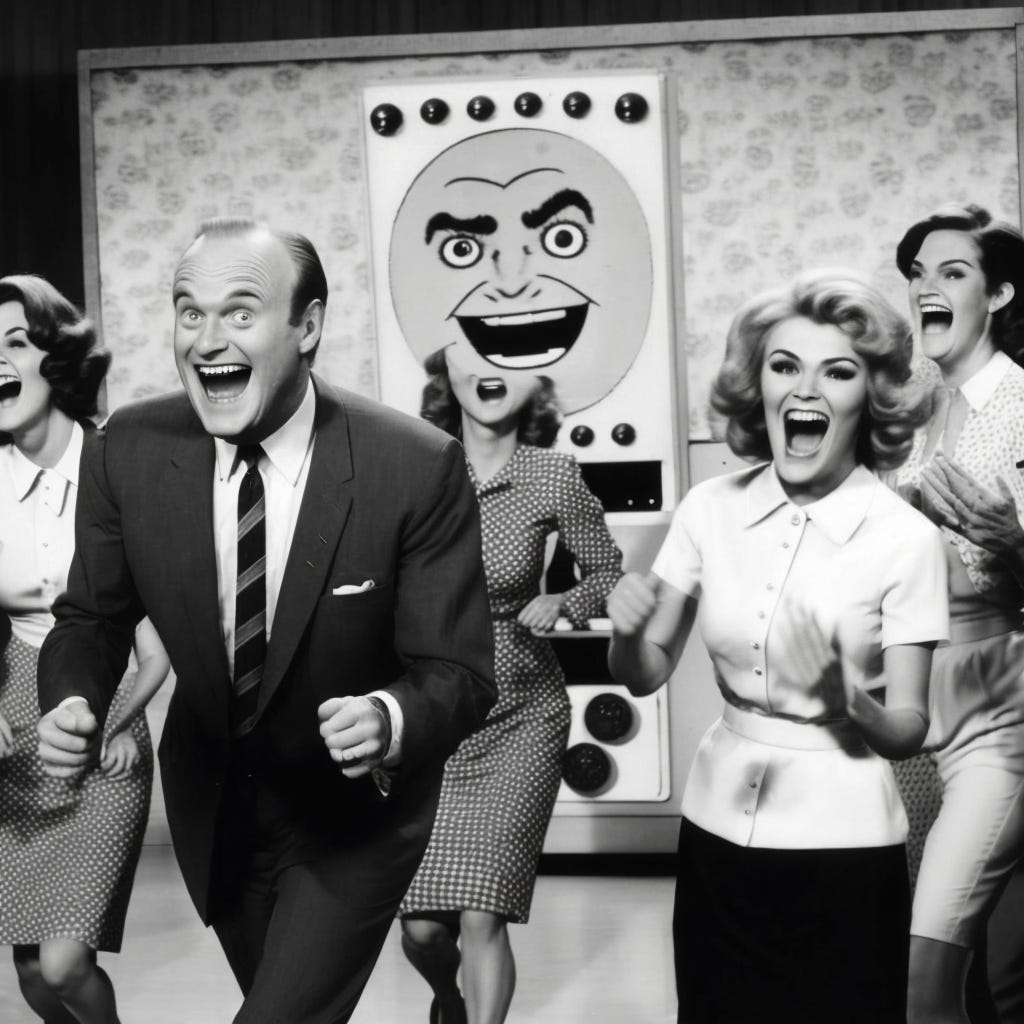

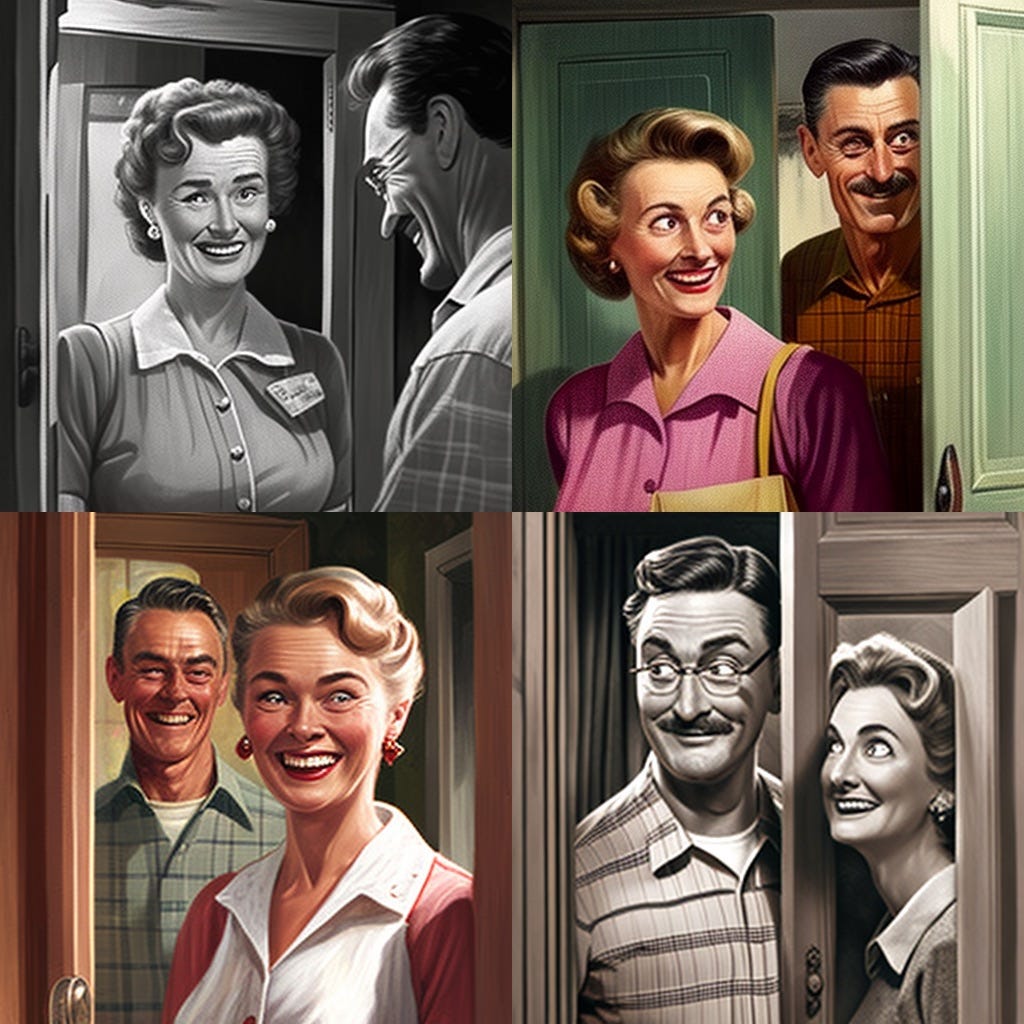








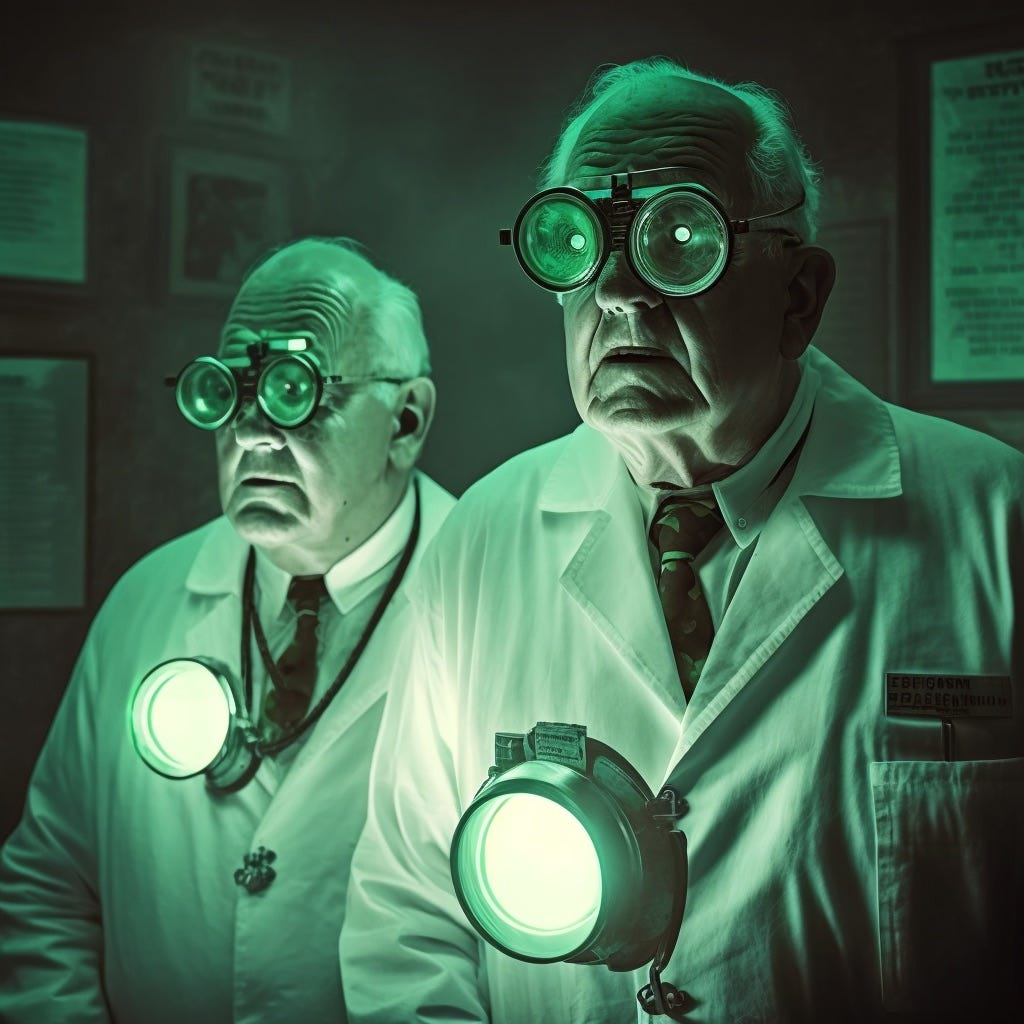
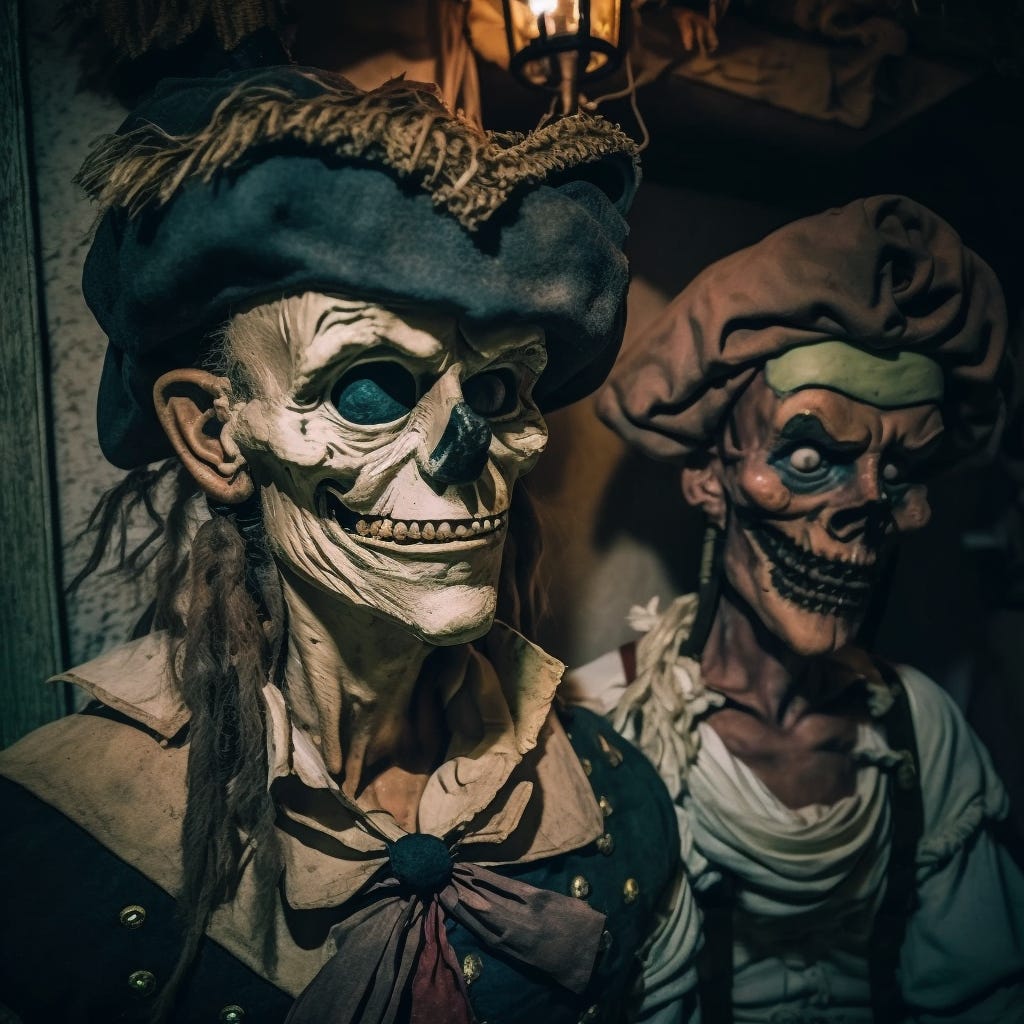

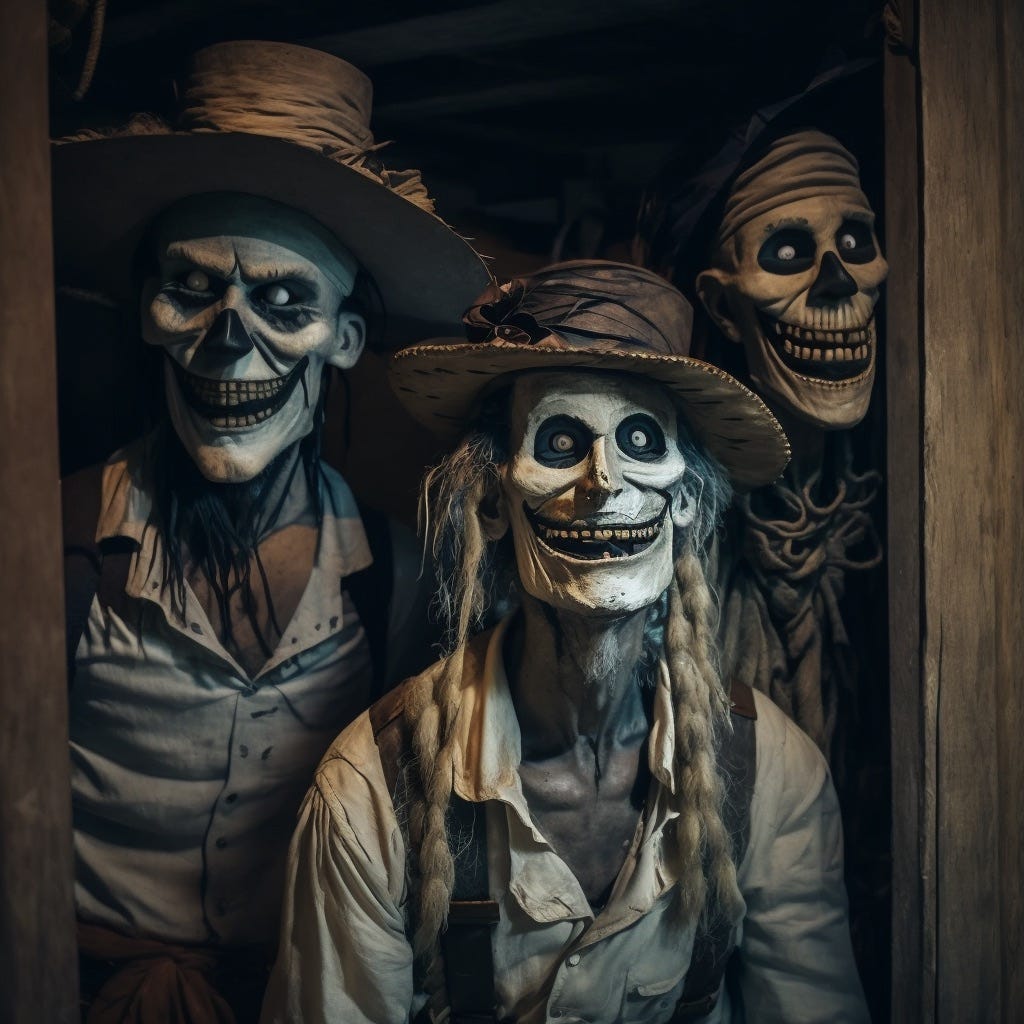
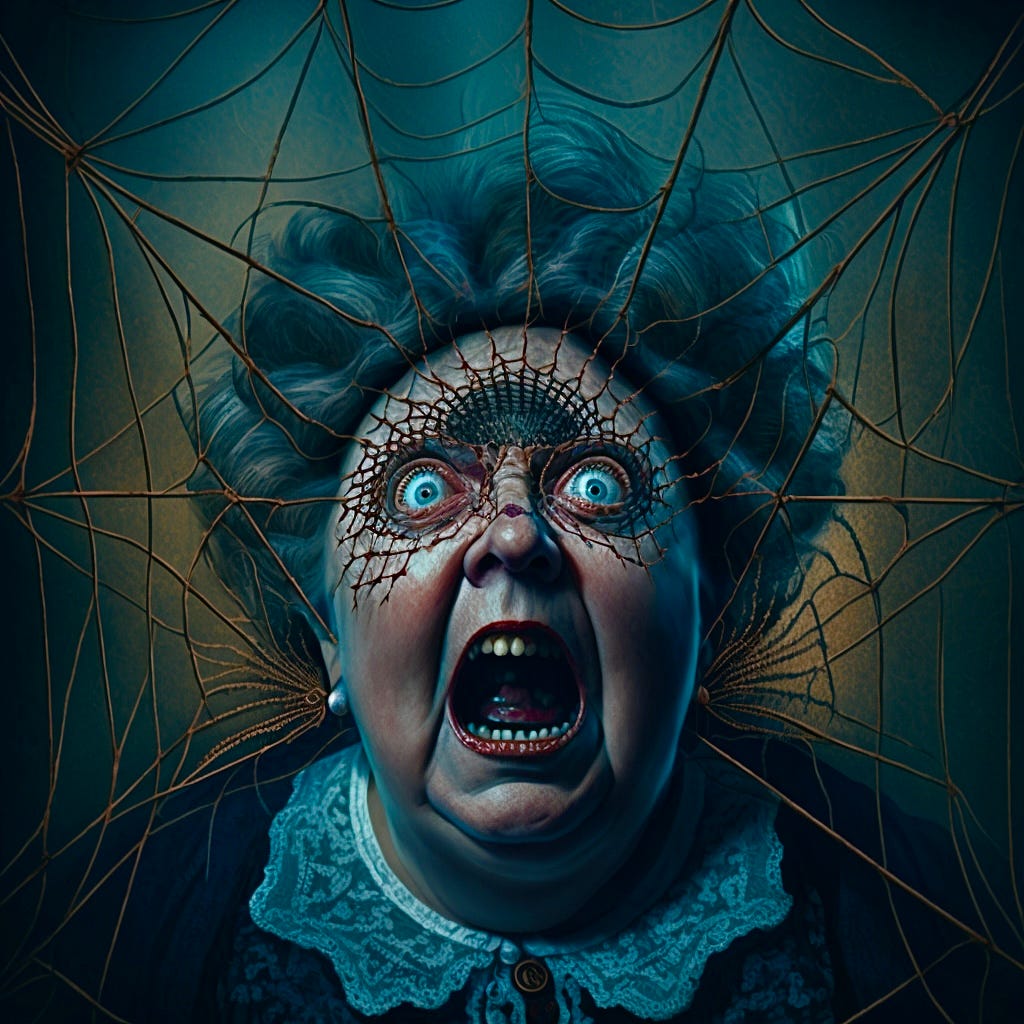

Breathtaking invention, Daniel! And, you may well be onto something with the game show: Who’ll Share My Loveseat?
Wow, I was really struck by the imagery and illustrations playing on the classic tv and game show era. They really capture a species of phoniness that was at large pre-social media.